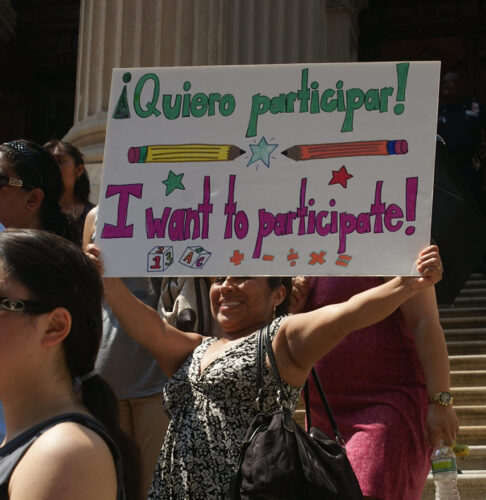
Advocates for Children of New York (AFC) issued the following statement in response to the release of the New York City Department of Education (DOE)’s special education data report for the 2021–22 school year.

AFC works to change education policy so that the public school system serves all children effectively. We publish policy reports and data analyses, testify at the City and State levels, speak out in the press to bring attention to the challenges facing the students and families we serve, and join with other advocates, parents, youth, and educators to call for change.

181 Results Found

Advocates for Children of New York (AFC) issued the following statement in response to the release of the New York City Department of Education (DOE)’s special education data report for the 2021–22 school year.

This January 2023 report provides an overview of the current — and dire — state of education for students in foster care in New York City. The report analyzes City data obtained through a Freedom of Information Law (FOIL) request and makes recommendations for how the City can better support students in foster care now that the DOE’s new foster care team is up and running.

The January 2023 issue brief highlights the need for sustained investments to support education initiatives funded with one-time federal COVID-19 stimulus dollars after that funding expires.

Kim Sweet, Executive Director of Advocates for Children of New York (AFC), issued the following statement in response to the release of the City’s Fiscal Year 2024 preliminary budget.

Advocates for Children of New York (AFC) issued the following response to the release of the New York City Department of Education (DOE)’s suspension data report for the 2021-22 school year.

The 2021–22 school year marked the seventh consecutive year in which more than 100,000 New York City public school students experienced homelessness.

Kim Sweet, Executive Director of Advocates for Children of New York (AFC), issued the following statement in response to the release of the 2022 New York State English Language Arts (ELA) test scores for New York City, showing that only 36% of Black and Hispanic students, 18% of students with disabilities, and 13% of English Language Learners (ELLs) in grades 3–8 are reading proficiently.

This June 2022 data analysis estimates that more than 329,000 public school students do not have a parent who speaks English fluently and calls for investments in a permanent, central system for immigrant family communications at the Department of Education (DOE). The analysis uses data from the U.S. Census Bureau American Community Survey (ACS) to illustrates the need for multi-faceted approaches to communication that go beyond making translated documents available online.

According to monthly attendance data released by the New York City Department of Education (DOE), students living in homeless shelters continued to have significantly higher rates of absenteeism than their permanently housed peers following the full reopening of schools in fall 2021, and attendance disparities remained larger than they were prior to the pandemic.

Kim Sweet, Executive Director of Advocates for Children of New York (AFC), issued the following statement in response to Mayor Adams and Chancellor Banks’ announcement of plans to support students with dyslexia.